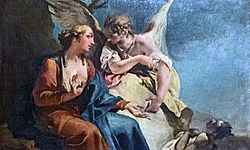Hagar in the Desert (Pittoni) facts for kids
Quick facts for kids Hagar in the Desert |
|
|---|---|
| Italian: Agar confortata da un angelo nel deserto, French: Agar dans le désert | |
 |
|
| Artist | Giambattista Pittoni |
| Year | c. 1230 |
| Type | Oil on poplar |
| Dimensions | 27 cm × 38 cm (10.5 in × 15 in) |
| Location | Santa Maria Gloriosa dei Frari, Venice |
Hagar in the Desert is a famous painting created by the Italian artist Giambattista Pittoni. He painted it around 1720-1725 in Venice, Italy. This artwork is a great example of the Rococo art style, which was popular in the 18th century. Today, you can see this painting in the sacristy of the Santa Maria Gloriosa dei Frari church in Venice.
What the Painting Shows
This painting tells a story from the Bible, focusing on a woman named Hagar and her son, Ishmael.
The Story of Hagar and Ishmael
Hagar was an Egyptian maidservant to Sarah, who was the wife of Abraham. Hagar became the mother of Abraham's first son, Ishmael. Later, Sarah also had a son named Isaac.
One day, Isaac made fun of his older brother, Ishmael. Because of this, Sarah asked Abraham to send Hagar and Ishmael away. Abraham was sad but gave them some bread and a bottle of water. He then sent them into the desert of Beersheba.
An Angel's Help
As Hagar and Ishmael traveled, their water supply ran out. Hagar thought her son would die, so she placed Ishmael under a small bush. She then moved a little distance away and began to cry.
But then, an angel appeared! This angel is often thought to be the archangel Michael. The angel showed Hagar a nearby water well. This discovery saved both Hagar and Ishmael.
Common Art Theme
The story of Hagar and Ishmael, especially the parts about their exile and the angel's appearance, was a popular subject for artists. Many Italian and Dutch painters in the 17th century created artworks based on this very scene.
 | Georgia Louise Harris Brown |
 | Julian Abele |
 | Norma Merrick Sklarek |
 | William Sidney Pittman |

